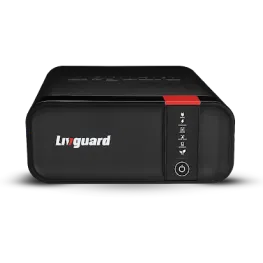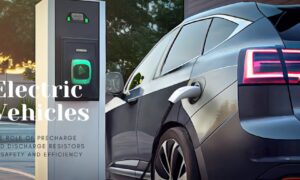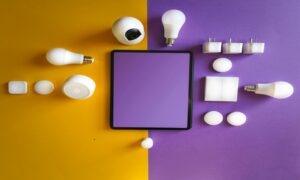There’s no denying that the rising energy consumption is a major issue. Discussions and proactive measures are already in place. The question being asked: What’s the solution? We can’t do without energy, which brings us to look for a more practical solution – sustainable practices and considerate usage of electricity. How do inverters fit into this discussion?
We turn to inverters whenever our main grid fails. These are commonly and frequently used all over the country. In areas prone to power outages, inverters are an integral part of the power backup system. Sustainable choices obviously have become a priority when choosing inverters. This is where inverters powered by artificial intelligence (AI) help us make the point. With certain features and properties, AI-powered inverters can very well be the answer to smart energy management. How’s that? Let’s find out!
What Exactly is an AI-Powered Inverter?
The journey of this useful power backup system started with the traditional inverter that converts DC produced by batteries or solar panels into AC for powering grid systems and household appliances. While the base operation remained the same, these devices continued to be updated with new and upcoming technologies and features to become more suitable for modern-day use. Consider the integration of AI into inverters a significant advancement in the field. This integration supports real-time data analysis, predictive decision-making, self-optimisation, and the like?
How are AI-Powered Inverters Shaping the Energy Landscape?
The use of AI in inverters has brought in many significant changes. These AI-powered devices address the issue of energy management and then some.
1. Smart AI Charging
One of the most striking features of AI inverters is their intelligent AI charging mechanism. Unlike regular inverters that use a pre-defined charging algorithm, these advanced systems are equipped with artificial intelligence that reads real-time data from the batteries, such as charge voltage, backup time, and charge percentage.
This smart system regulates the charging pattern dynamically based on the present condition and the need of the battery. Let’s take an example. Sometimes, batteries are partially charged. If that’s the case, an AI-powered inverter can reduce the charging rate to prevent the battery from overcharging, thus reducing the chances of overheating and further damage. On the other hand, if the battery has very little to no charge, the device can increase the charging rate. The battery will then charge fast without putting much strain on the system.
The result? Increased charging, better energy consumption, and extended battery life. In the long term, that translates into reduced battery maintenance costs and replacements, resulting in long-term economic and environmental benefits.
2. New Generation Technology
Today’s AI-based inverters are not only intelligent, they’re also constructed with newer-generation MOSFET-based PWM (Pulse Width Modulation) technology. Such sophisticated circuitry offers higher efficiency, dynamic voltage stability, and power loss reduction at conversion by a large margin.
Conventional inverters tend to have energy loss because they generate heat and have low conversion ratios. But with PWM inverters using MOSFETs, energy transfer from the battery to appliances is cleaner and more controlled. This means every unit of power consumed from your battery or grid is used more efficiently.
What does this mean for the consumers? This equates to reduced monthly electric bills and increased reliability, particularly during peak times or varying voltage situations. It also ensures more even operation of delicate equipment that requires a stable and high-quality power source.
3. Greater Load-Carrying Capacity
Another salient advantage of AI-based inverters is their higher load-carrying capacity. With growing energy demands, be it due to additional appliances, larger families, or work-from-home arrangements, the traditional versions may not keep up, often tripping or warming to the extent of burning out under pressure.
Contrary to this, contemporary AI-powered inverters have the capacity to perform heavy-duty operations with utmost ease. They are accompanied by robust internal architecture to support several high-load devices simultaneously, such as refrigerators, air coolers, washing machines, or computers.
Therefore? These inverters are the perfect fit for households requiring extended power backup due to lengthy power cuts. The smart integration will ensure a smooth transition between the main grid and the backup system, and supply power without any disruption.
Smart Energy, Smarter Performance
At the core of each AI-based inverter is a simple but powerful concept: be smarter about your energy usage to achieve more consistent performance with fewer interruptions. Conventional inverters use an all-purpose approach. They charge batteries and power appliances at standardised rates. AI-based invertors, by contrast, can think and adjust.
With inherent intelligence, the inverters are able to monitor real-time conditions, how much is being drawn, how much is stored, how the health of the battery is, and other conditions. Adjusting their operations automatically according to the continuous analysis, they utilise energy with maximum efficiency at each step.
This intelligent energy management not only saves power, but it also enhances the overall operation of your energy system. Devices perform more efficiently, the inverter reacts faster to load or supply changes, and your battery lasts longer and works better. With less energy lost to overcharging, voltage dips, or poor conversion, more power is ready when you need it.
In addition, smarter use avoids wearing out your system. Batteries are protected from overuse, the inverter itself runs cooler and quieter, and the entire installation lasts longer with less downtime. If you’re dealing with persistent outages or just need to cut energy bills, AI-driven inverters combine the power of reliable performance with the intelligent ability to adapt to your unique usage patterns.
Wrapping Up!
It is no longer about merely using less electricity, but more about smart use. This is exactly where AI can assist. With AI at the back, you can expect a more reliable performance from the device and more optimised use of energy. These are the features that are required at the present time.
Safe to say, AI-driven inverters mark the new horizon of intelligent, clean energy management. By integrating real-time analysis, predictive insight, and adaptive control, they far exceed simple energy conversion. They’re enabling people, companies, and utilities to use energy more efficiently, save money, and get closer to a more sustainable world. With increasing mainstream adoption of renewable energy, embracing such AI-based solutions will be critical to maintaining stability, efficiency, and growth within a fast-changing energy environment.

































